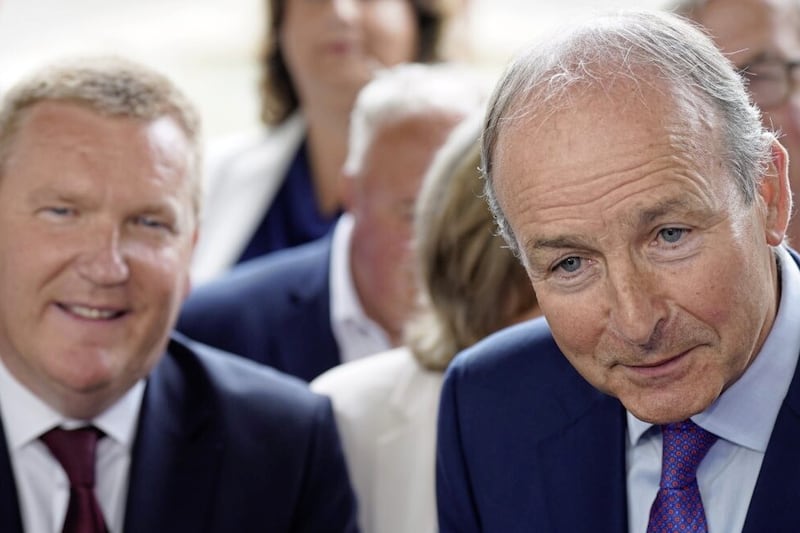As I was scrolling through Twitter on Sunday after the match, the tweet that stood out for me the most was simply three words: “Kerry was robbed!”
Now as a Derry woman who lost out to Kerry in the semi-final, I wanted to agree, as technically it would have been better for us if Kerry had won the championship. It is easier, after all, to accept being beaten by the champs than being beaten by the team who went on to lose to the Dubs. I felt I had to say that before I go on.
But it wasn’t so much what the tweeter said than who the tweeter was, for it was none other than John Taylor, aka Lord Kilclooney, who, in fairness, would be more associated with his love of the United Kingdom than of THE Kingdom.
What was most positive in those three words is that someone who came from a background which would not traditionally have watched GAA clearly had formed a view about a game that they had just watched.
Kerry was ‘robbed’!
— Lord John Kilclooney (@KilclooneyJohn) July 30, 2023
For the first time, the BBC broadcast the All-Ireland football final live not just in the north, but in Britain as well. This was a significant recognition of the Irish diaspora living in Wales, Scotland and England.
But not only that, it also provided the opportunity to showcase to tens of thousands of people who would not have been familiar with Gaelic games what BBC presenter Thomas Niblock described as “the biggest sporting event in Europe this weekend”.
Read more:
The BBC introduces Britain to All-Ireland football final day
Dublin do enough to see off Kerry and mis-firing David Clifford
For those of us who grew up watching Gaelic games or, in many instances, listening to the All-Ireland final on the wireless and who spent years transporting children to and from training and matches, Féile na nÓg and all things in between, we sometimes take for granted just how special our national sport is.
I think that is why for me, the BBC coverage of the match was an opportunity to reflect on just how special Gaelic games are.
Is there another sport in the world where eighty two and a half thousand people will come out on a Sunday afternoon to watch a bunch of baristas, barristers, bricklayers and everything in between, and all amateurs, play 70 minutes of fast-paced football at fitness levels that would equal or better that of a Premiership soccer player?
Is there anything that drives community loyalty and solidarity more than getting behind your club or your county?
There is no transfer market. You don’t choose your club or county, you are born into it. As such, it is a unique showcase of geographic and cultural identity.
The very clever device and great success of the BBC NI coverage was that it brought in faces that were very familiar to a British audience to talk about their knowledge and experiences of Gaelic games.
Actor Paul Mescal spoke about how for him, as for others, it was the defining factor of his childhood and teenage years and how, as an inter-county player, he had marked Con O’Callaghan and Cormac Costello who were playing for Dublin on the day.
Patrick Kielty spoke of how the All-Ireland final was a bucket list event for people in and outside of Ireland. He said: “This is the Irish Superbowl, that’s it.”
Making up the quartet of commentators was Dara Ó Briain, a former county minor player, and Adrian Dunbar, who is heavily involved in Fermanagh GAA.
Wonderful afternoon at the All-Ireland football final yesterday. Delighted to be part of the first BBC national broadcast of the final, and to be in such good company. Obviously after the final we all parted company quietly to return to our homes and reflect; and I am not HANGIN’ pic.twitter.com/2xiNE2a9sK
— Dara Ó Briain (@daraobriain) July 31, 2023
It really was a genius move to bring in people from some of the most highly-rated television programmes of the last 10 years to share their passion. It worked and the commentary online was overwhelmingly positive.
Reverend Richard Coles, formerly of The Communards, was just one example of positivity when he tweeted that he was worried he was going to go hoarse shouting “handball” from reflex during the transmission of “one of the greatest sporting events IN THE WORLD”. (emphasis his)
How do you do that solo thing? #GAA pic.twitter.com/cXUZ9uiYy3
— Richard Coles (@RevRichardColes) July 30, 2023
Others commented on how they couldn’t believe this was an amateur sport, or how the pace was so much better than soccer or rugby. No gimmicks, just pure sporting theatre.
But it was a childhood neighbour and massive GAA supporter that really summed up for me why it was such a positive thing to see the match being broadcast live across these islands. It was an opportunity to display the brilliance of our games and to challenge stereotypes. It was good to see it happen because it’s simply a better game.
“It’s better because it brings out the best in all of us.”
Read more:
Patricia MacBride: Lessons for life from Barbieland
Patricia MacBride: Golf's Saudi sports washing feels different







